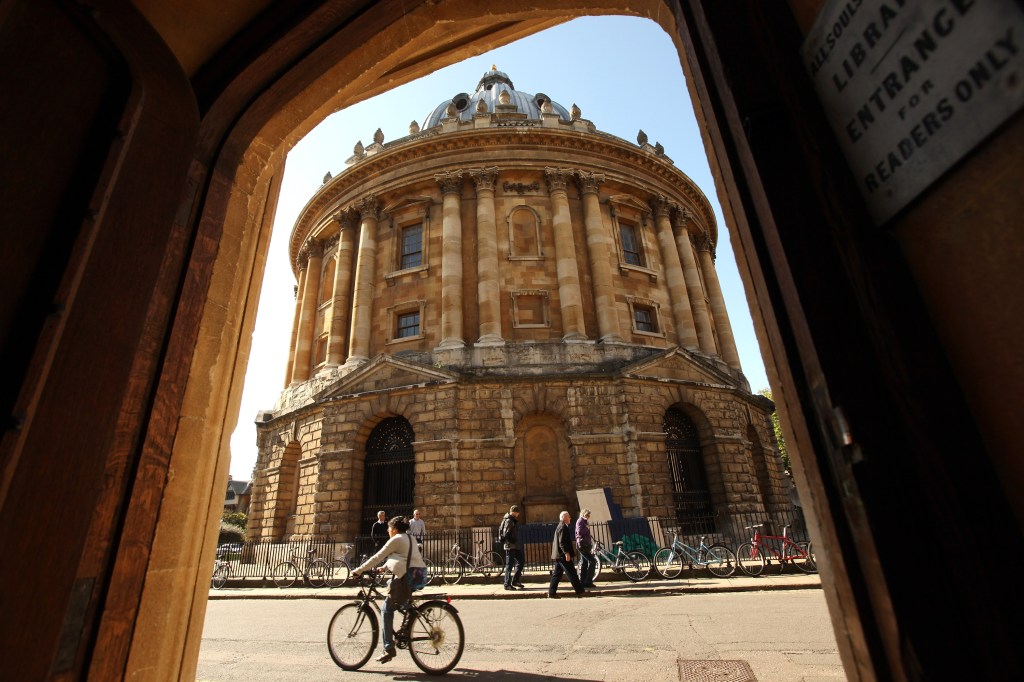Richard Dawkins and more sign letter in support of gender critic Kathleen Stock amid Oxford row

Kathleen Stock’s participation in Channel 4’s Gender Wars was announced in April 2023. (YouTube)
More than 40 University of Oxford academics have signed an open letter supporting so-called ‘gender critical’ activist Kathleen Stock, as the row over her upcoming appearance at the Oxford Union rages on.
The former University of Sussex philosophy professor, who stepped down from her job when criticised for her views on trans people, is slated to give a talk at the university’s 200 year-old debating society on 30 May as part of its Trinity Term card.
News of her event quickly saw backlash from students, with the university’s LGBTQ+ society saying it was “dismayed and appalled” by the decision to platform her and several colleges passing motions condemning her appearance on campus.
In response to the student pushback, a number of leading Oxford dons – including evolutionary biologist Richard Dawkins – have signed an open letter in support of Stock and “free speech”.
The academics, who describe themselves as having a “range of different political beliefs, Left and Right”, said they condemn the student union for severing ties with the Oxford Union after “after the latter’s refusal to rescind an invitation” to Stock.
However, an email shared with PinkNews from the Oxford SU mailing list shows the decision to cut ties with the debating society and private members’ club was nothing to do with Stock, despite what a number of national titles have reported.
The decision was instead due to a documented history of alleged “bullying, sexual harassment, discrimination and data privacy breaches which affect students”.

As reported by The Oxford Student earlier in May, the SU said it had concerns that unlike other student societies there is no “external body to regulate or hold the Union accountable for its actions”.
“The SU has a duty to take necessary actions to safeguard all members of the Oxford student community,” the organisation added.
The move means the debating society is no longer able to have a stall at freshers fayre at the start of the academic year, which it uses to gain a number of its members.
The letter from the dons continued that cutting ties between the SU and Oxford Union is “dangerous territory”.
“Universities exist, among other things, to promote free inquiry and the disinterested pursuit of the truth by means of reasoned argument.
“To resort to coercion and financial threats when unable to secure one’s preferred outcome in debate would represent a profound failure to live up to these ideals,” they wrote.
They went on to add that universities should “remain places where contentious views can be openly discussed”.
“The salient alternative to this, one apparently favoured by many of Professor Stock’s opponents, is simply unacceptable: a state of affairs in which the institutions of a university collude to suppress the expression of controversial, but potentially true, viewpoints in an effort to prevent them from becoming more widely known,” they said.
In response to the open letter, Stock wrote on Twitter: “Grateful to the Oxford faculty who signed an open letter standing up for the Union’s right to invite me, and have others hear me speak.”
‘Disregarding the welfare of its LGBTQ+ members’
In a statement released in April when the news about Stock’s appearance became public, the student LGBTQ+ society said the Oxford Union is “disregarding the welfare of its LGBTQ+ members under the guise of free speech”.
The Oxford Union subsequently announced it would offer support and welfare resources over the talk.
A spokesperson for OULGBTQ+ Society said: “Letting Stock bring her campaign of hate and misinformation to Oxford, allowing her to stoke fear against trans people without challenge or opposition – right before Pride month and at a time when the trans community is facing a constant attack on its lives and rights – is a move we vehemently oppose and will actively protest [against].”
In response, the philosophy professor took to Twitter once again, where she slammed the society’s statement and said it contains “several falsehoods” and though she is “not a lawyer” is “probably defamatory”, however she did not expand on the comments.
“Also, it makes you look utterly ridiculous,” she added.

The letter and signatories, as published in The Telegraph, reads as follows:
“Sir,
We are academics at the University of Oxford, possessed of a range of different political beliefs, Left and Right. We wholeheartedly condemn the decision of the Oxford University Student Union (Oxford SU) to sever its ties with the Oxford Union (the Union) after the latter’s refusal to rescind an invitation to the philosopher and gender-critical feminist Kathleen Stock.
Professor Stock believes that biological sex in humans is real and socially salient, a view which until recently would have been so commonplace as to hardly merit asserting. Whether or not one agrees with Professor Stock’s views, there is no plausible and attractive ideal of academic freedom, or of free speech more generally, which would condemn their expression as outside the bounds of permissible discourse. Unfortunately, the position of her opponents seems to be that Professor Stock’s views are so illicit that they cannot be safely discussed in front of an audience of consenting and intelligent adults at the main debating society at the University of Oxford. If this were the case, it is doubtful that they could be safely expressed anywhere – a result that, as her opponents are no doubt satisfied to find, would amount to their effective prohibition.
Fortunately, it has become clear that the Union’s capitulation cannot be secured by the usual methods of moralistic browbeating and social censure. However, Oxford SU is now threatening its financial model by seeking to prevent the Union from having a stall at future freshers’ fairs. This is dangerous territory. Universities exist, among other things, to promote free inquiry and the disinterested pursuit of the truth by means of reasoned argument. To resort to coercion and financial threats when unable to secure one’s preferred outcome in debate would represent a profound failure to live up to these ideals.
Universities must remain places where contentious views can be openly discussed. The salient alternative to this, one apparently favoured by many of Professor Stock’s opponents, is simply unacceptable: a state of affairs in which the institutions of a university collude to suppress the expression of controversial, but potentially true, viewpoints in an effort to prevent them from becoming more widely known.”
Signed:
Dr Julius Grower, Faculty of Law and St Hugh’s College
Dr Michael Biggs, Department of Sociology and St Cross College
Dr Roger Teichmann, St Hilda’s College
Professor Nigel Biggar, Regius Professor Emeritus of Moral Theology, Faculty of Theology
Professor Jeff McMahan, Sekyra and White’s Professor of Moral Philosophy, Faculty of Philosophy and Corpus Christi College
Dr Edward Howell, Department of Politics and International Relations and New College
Dr Marie Kawthar Daouda, Oriel College
Dr Jonathan Price, Faculty of Law and St Cross College
Colin Mills, Department of Sociology and Nuffield College
John Maier, Balliol College
Dr Alexander Morrison, Faculty of History and New College
Dr Richard Gipps, Blackfriars Hall
Professor Carl Heneghan, Professor of Evidence-Based Medicine
Kathryn Webb, Oxford Institute of Clinical Psychology Training and Research and Harris Manchester College
Dr Tim Mawson, St Peter’s College
Edward Hadas, Blackfriars Hall
Professor Richard Dawkins, New College
Professor Jonathan Jones, Department of Physics and Brasenose College
Professor Lawrence Goldman, Emeritus Fellow, St Peter’s College
Professor James Binney, Rudolf Peierls Centre for Theoretical Physics and Merton College
James Forder, Balliol College
Clive Hambler, Lecturer in Biology and Human Sciences, Hertford College
Daniel Villar, Department of Biology
Yuan Yi Zhu, Research Fellow, Harris Manchester College, and Nuffield College
Professor Richard Ekins KC (Hon), Professor of Law and Constitutional Government, St John’s College
Professor Julian Savulescu, Uehiro Chair of Practical Ethics, Faculty of Philosophy
David Carpenter, Faculty of History
Professor Timothy Williamson, Wykeham Professor of Logic, Faculty of Philosophy
Daniel Kodsi, Trinity College
Professor Susan Bright, Professor of Land Law, Faculty of Law
Professor Joel David Hamkins, Professor of Logic, Associate Faculty Member, Faculty of Philosophy
Dr Ruth Dixon, College Lecturer, the Queen’s College
Professor John Tasioulas, Professor of Ethics and Legal Philosophy, Faculty of Philosophy and Balliol College
Xenofon Kalogeropoulos, Faculty of Classics and St Anne’s College
Jane Cooper, All Souls College
Dr Abhijit Sarkar, Faculty of History
Professor Edward Harcourt, Professor of Philosophy, Keble College
Professor Michael Bentley, Senior Research Fellow, St Hugh’s College
Professor Catharine Abell, Faculty of Philosophy and the Queen’s College
Professor John Chalker, Department of Physics and St Hugh’s College
Dr Sophie Allen, Faculty of Philosophy and St Peter’s College
Professor Volker Halbach, Professor of Philosophy, New College
Sir Noel Malcolm, All Souls College
Aftab Mallick, Brasenose College

